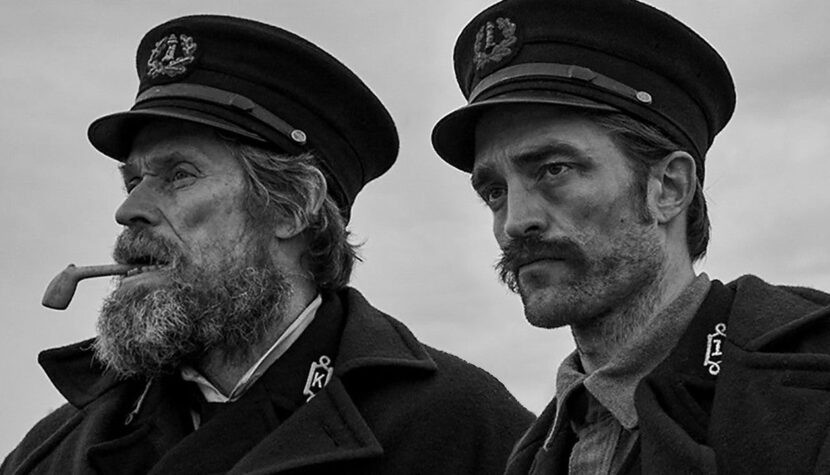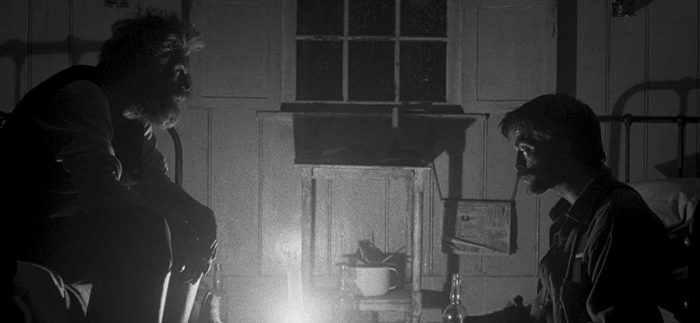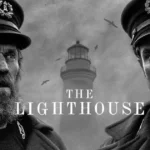THE LIGHTHOUSE Review. Consuming Anxiety

The light of the lighthouse. From the first seconds, it dazzles us with its brilliance, and day by day, the characters desire it more. Surrounded by thick fog, it creates a disconcerting atmosphere of emptiness and unending longing. Powerful waves crashing against the rocks evoke a feeling of panic within us. We fear like those sailors, enveloped in total darkness. We are suffocated by the fear that we might never again be allowed to see the sun. Then, the first reflections related to the lighthouse emerge. Its lens is, after all, the only source of light in the vicinity. We need it not to go insane, not to lose ourselves in the flood of thoughts that are impossible to express. We desire to steal them, to have them just for ourselves; in the end, we treat them with the utmost sanctity. The lighthouse becomes our little nucleus of darkness.
The anxiety emanating from Robert Eggers’ film engulfs the viewer in an unprecedented way. The two keepers tending to the lighthouse on a small, rocky islet feel from the beginning what the viewer does—nervous excitement. They don’t want to be there; it’s the embodiment of all nightmares. Paradoxically, however, they yearn to be part of this terrifying experience. Eventually, they agreed to it, more or less knowing what they were getting into. The tension grows minute by minute, reality blending with a dreamlike nightmare, and the mirage materializing at the least appropriate moments. The psychological state of our protagonists is on the brink of madness. When it reaches its climactic moments, all hidden metaphors are set free.

Young Ephraim Winslow (thin, pale Robert Pattinson) and aging Thomas Wake (remarkable Willem Dafoe) are vastly different characters with entirely distinct histories. Ephraim is just beginning his adventure in the profession, while Thomas could be called a true seafaring wolf. Their relationship particularly exudes respect—contrasting the experienced expert with the young man, unknowing about life, “an open book,” the creators strive to convey their significant differences, whether in their approach to life or their attitude towards their work. This leads to conflicts, becoming more frequent and intensifying, and we await their peak. We can also attach this to authorial autotelism—Pattinson, giving his all, doesn’t stand a chance in a confrontation with the acting master Dafoe. The latter, embodying the talkative sailor, the repulsive type who knows his worth, quickly shows us who’s in charge here. Wake is the archetype of an insufferable sailor, a Marlow from Joseph Conrad’s novel, though I’m not sure if he has as good a heart.
The black-and-white aesthetic harmonizes brilliantly with the sea breeze, lending The Lighthouse a mysterious atmosphere very much in Conrad’s style. Here, most things are like in his readings—stories of sirens and fantastical creatures, chewed over by a seasoned sailor, the rough and unpleasant scent of escaping humanity. The directorial concept of this film deserves appreciation, as the effect immerses the viewer in silent awe. Austere framing and unconventional camera movements blend into a dramatic entirety, and aquatic motifs merely enhance the feeling of being tightly enclosed in a remote corner of the world. In a maritime hell.

There’s also room for a reinterpretation of the Prometheus myth. Vultures are replaced by seagulls, and Pattinson takes on the role of a hero seeking his purpose in a world without people. Over time, Dafoe seems more like a satanic Zeus than the amiable Marlow. Both characters strive for one thing—to gain the light from the lighthouse, which could be their last hope of fulfilling their whimsical impulses to save themselves from dense madness. Winslow’s hatred for his older colleague grows from frame to frame. He is not allowed near the precious source of light—his superior prevents it, monopolizing the treasure solely for himself. Ephraim desires Promethean fire and will do much to obtain it, even if it drives him insane. Or perhaps he already has, and the significance of the lighthouse isn’t as substantial as it initially appears?
Although The Lighthouse falls somewhat short of being a complete masterpiece, it presents itself not so much as a surprise but as a versatile and devilishly irreverent film, where the macabre is part of daily life, and mythical poetics endure until the very end. Ephraim Winslow feels fear from the beginning, he just doesn’t know it. We do too.


